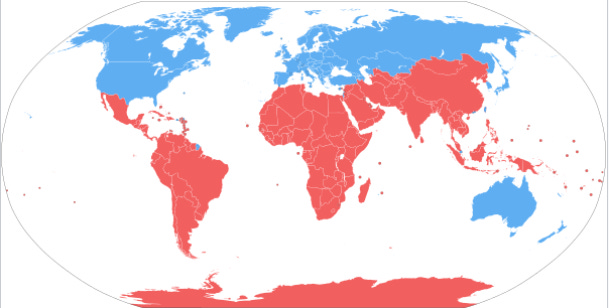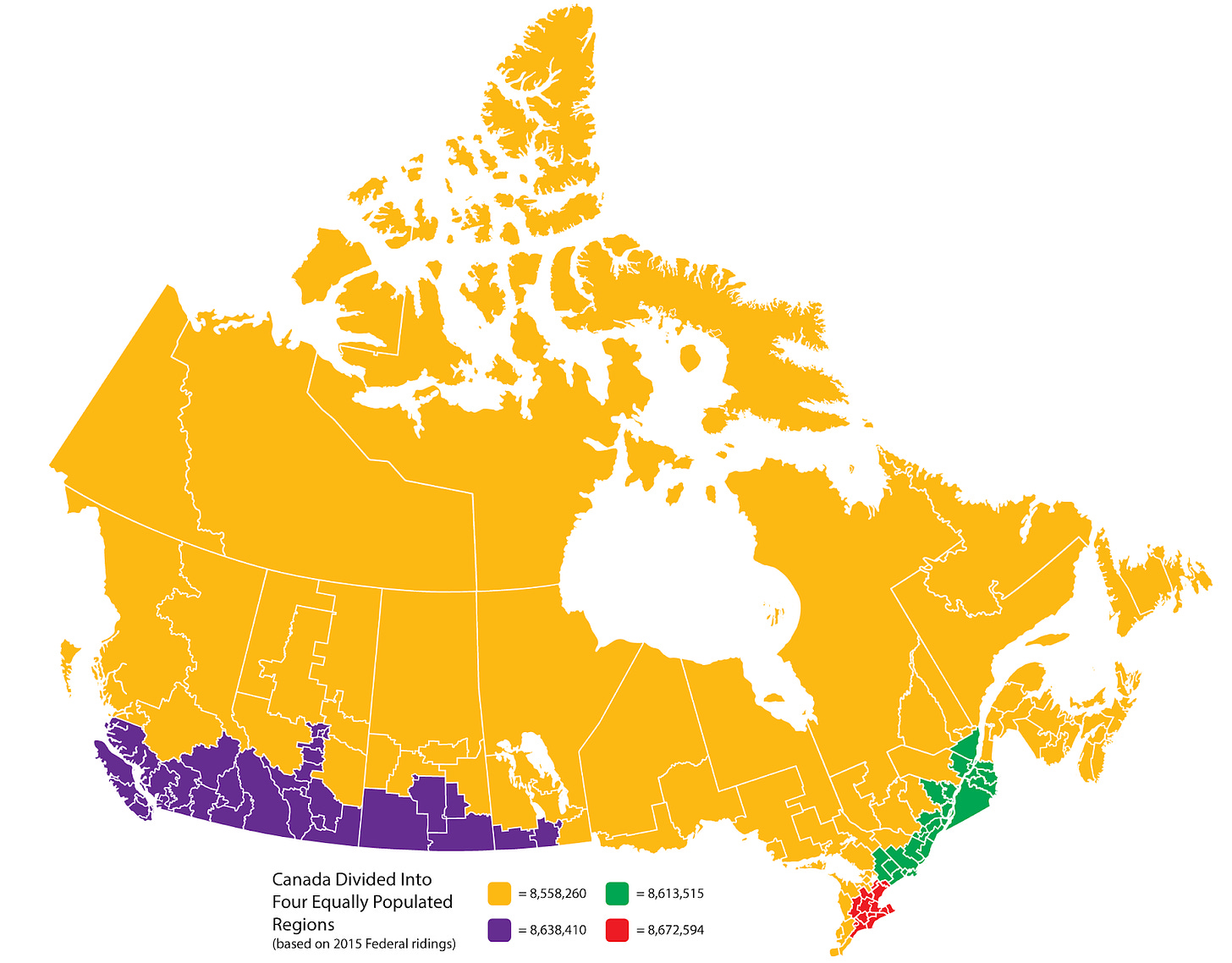I’ll get to this week’s glimpse behind the paywall in a moment. But first, please forgive the self-indulgence of what is not merely an advert, but one which contains video footage of my actual face.
This is the big week: my new book, A History of the World in 47 Borders: The Stories Behind the Lines on Our Maps, is finally out on Thursday. This will come as a surprise to the gratifyingly large number of people who’ve already found it in Waterstones, Foyles or elsewhere and sent me photographs of their copy – but it does mean that those who’ve ordered through Amazon, or are waiting for the ebook or audiobook, will get theirs this week.
I’m genuinely quite excited about this one being out there, so much so that I’m repeating myself and re-using the same video which my lovely colleagues at Paper Cuts were kind enough to make for me last week:
I really hope you buy it, like it and ideally say nice things about it on the internet to aid me in my sinister plans for global conquest through the medium of nerd content, too.
Right, that’s enough of that, here’s some of that content, dating from all the way back in February 2022…
Being the kind of highly intelligent and devastatingly attractive reader that you are, you’ll be intimately familiar with the fact England has a north-south divide. There are arguments to be had, over the extent to which it’s the result of policy rather than geography, and nuance in the fact there’s still plenty of affluence in the north and poverty in the south. But what is not up for debate is that the south east in aggregate has both more money and higher GDP than the north, and that this has been a huge factor in British politics over a period of decades.
This is very bad. It is not, however, unusual. North-south divides are surprisingly common – even if they are sometimes, from an English point of view, the wrong way up. Here are some of my favourites.
Country: Italy
Which half is richer: North
The two ends of Italy have had radically different histories, since that whole Roman Empire thing fell apart. The various kingdoms and city states of the north were run, at various points, by Holy Roman, French and Austrian Empires, and industrialised relatively early; the south spent most of the eight centuries before Garibaldi got involved being called the Kingdom of Sicily, and didn’t.
Even at the time of unification in 1860, the north was probably richer and more developed than the south. But both the size of the gulf, and how much the new Piedmont-dominated Kingdom of Italy did to widen it, remains contested. At any rate, today the north sees the south as poor, corrupt and dominated by organised crime, and the south sees the north as a bunch of stuck up bastards many of whom spent decades voting for a political party that wanted their own country.
The new state proposed by the Lega Nord separatists, incidentally, would have been called Padania. This is at least mildly ironic, since this is the bit that spent much of the early middle ages as the Kingdom of Italy, which the south did not.
Moving on…
Country: Belgium
Which half is richer: North
Once upon a time it was the southern French-speaking Wallonia that was Belgium’s industrial powerhouse thanks to coal, steel and all the other things that were helpful if you wanted to make a lot of money in the late 19th century. Today, though, Wallonia has a lot of the economic problems of other depressed, post-industrial regions I could name, and it’s the northern, Dutch-speaking Flanders that has the booming service economy, higher GDP, lower unemployment and so on.
The odd thing is, though, that the same sorts of stereotypes apply as in Italy: the Flemish speakers in the north are hard-working and abstemious, the Walloons, in the words of a recent Economist piece, “are deemed wily, lazy and corrupt: a race of drinkers and dreamers, faded gentry and public servants employed in vast numbers by a bloated patronage system”. This the Belgians credit to being on the border of the Latin and Germanic worlds; but it’s hard to avoid noticing that a) Belgium really isn’t that big and b) the southern Belgians aren’t on the Mediterranean, as are large chunks of Europe associated with such attitudes, but are in fact up the road from Calais and Lille.
Also, this modern stereotype of hard-working northern Europe and a lazy south tends to ignore the fact that the latter experienced centuries of art, literature and cosmopolitan civilisation while the former were still living in mud huts. Which doesn’t really fit.
Leaving Europe behind…
Country: USA
Which half is richer: North
It’s easy to slip, with all the stereotypes that go with the southern US (not to mention its annoying habit of voting for absolute dangers), into assuming that the north is the rich bit. And today that is, broadly, true. At the time of the Civil War – fought either over slavery, if you were from the north, or “state’s rights”, which was a euphemism for slavery, if you were from the south – that was probably true, too.
But it wasn’t always true. In the early years of the US, much of the political and financial power lay in the south – because it turns out that having large numbers of enslaved black people working your farm for you is quite a good way of both building up massive fortunes, and of giving you enough leisure time to swan off to do politics. The relative shift in status, between the previously powerful agricultural south and the rapidly industrialising north, was one of the biggest contributing factors to the big war they then fought.
Although the big one was, obviously, slavery.
Country: Nigeria
Which half is richer: South
Nigeria is big – big enough that it could eat France, and still find room for the UK, too. On top of that, of all the many things European empires left behind them in Africa, decent infrastructure wasn’t one of them. Little wonder, then, Lagos, the historic capital in the country’s far south, feels a long way from the north, or that in 1991 the government moved to a new capital at Abuja, in the middle of the country.
Nonetheless, the country remains divided, between – I’m massively over-simplifying, not least as the country contains over 200 ethnic groups – a more prosperous, oil-rich and largely Christian south, and a less developed, largely Muslim north. The south has the oil; the north has the boko haram insurgency. Since around 1979, there’s been an unofficial compact that the presidency should alternate between north and south to help hold the country together, which is pretty cool.
(When did Britain last have a prime minister from the north of England? I can’t think of a reason not to count Tony Blair, who spent most of his childhood in Durham, which means the answer is 2007. If you can think of a reason not to count Tony Blair, the answer is Harold Wilson, 1976. That said, we’re ignoring Scotland, so.)
Country: Vietnam
Which half is richer: South
From 1954 until 1975, Vietnam was two countries, a communist north and a nationalist south. Since then, the south has seemed to fare better – consider this 2005 Economist headline, “Thirty years after Saigon fell, the south has prospered while the north has lagged” – which you could put down to the benefits of capitalism were it not for the uncomfortable fact that the south lost the war. Just as plausible is that, in the course of losing that war, the south’s American allies bombed the crap out of most of the north’s economic infrastructure.
Today, there remains a big cultural divide between the two halves of the country. Southerners consider themselves dynamic, tolerant, spendy, westernised and direct; northerners think of themselves as cultured, refined, thrifty, and formal. To what extent this is a legacy of the war it’s hard to tell, but it does look suspiciously like the ex-communist north looks to China while the formerly US-backed south looks to the west.
While we’re on Asian countries that got severely messed up by the Cold War…
Country: Korea
Which half is richer: Do you really need me to answer this one?
Okay, I think we can take that as read. But one fact that I find interesting about the Koreas is that they call the country – the historic, unified one, not the two bits that exist today – different things. In the north, Koreans refer to their country as Choso˘n, in reference to the Joseon dynasty, which ruled the country from 1392 until Japanese annexation in 1910. In the south, meanwhile, Korea is Hanguk, meaning, roughly, “great Han nation”.
Neither of these names, you will note, are “Korea”.
[Hey guys this comes up in my new book!]
Country: Canada
Which half is richer: Well, we’re not really talking about halves here because...
...look at this map from the ever reliable MapPorn subreddit. The majority of Canadians live hard by the US border; around 90% live within 100 miles of it. It’s not so much a case of “rich south, poor north” as one of "rich and poor far south, almost entirely unpopulated majority”. The same is true, albeit to not quite the same extent, of most of the Nordics.
Country: All of them
Which half is richer: North, by a lot
The northern hemisphere contains around 87% of the world’s population – it does, to be fair, have most of the land – which obviously makes it a lot richer.
That’s not generally what people mean when they start talking about the Global North and Global South, though. They generally mean this:

That means, confusingly, that the region once referred to as Manchuria, which is on roughly the same latitude as Yorkshire, is in the Global South by virtue of being in China, while Australia and New Zealand – places which nobody will ever accuse of northernness – are in the Global North. I can see why the old First/Second/Third World split isn’t helpful in an era in which the Cold War is behind us, while Developed/Developing World risks being inaccurate and Rich/Poor just plain rude. But nonetheless I can’t help but wonder whether Global North and Global South might not carry their own problems, too.
Anyway, if you want to read more about north/south divides and the stereotypes that go with them, that Economist piece I linked to earlier is well worth a read. An extract:
“Within many countries, strikingly similar north-south stereotypes crop up time and again. Such prejudices are often defended by references to climate, topography and history. Northerners are hailed for hard work and thrift… Southern regions are deemed friendlier but blighted by clannish corruption and idleness… The really startling detail is how often these stereotypes reset at national borders.”
You can read the rest here.
Also, we should really build some better trains in the north.
Self-promotion corner
If you’d like to read stuff like this when I write it, rather than when I deign to release it from the paywall and often not even then, my rates are very reasonable. For just £4 a month, or £40£28 a year, you can get a weekly dose of politics, maps and nerdery like the above, plus some diverting links.
Alternatively, as ever, if you want to read the newsletter but for whatever reason can’t justify the money right now, just hit reply and ask. I always say yes. Really. And if you want to pay up to support my generous approach to these things, oh look here’s another button:
Until the next time.
Also, I really hope you like the book.



